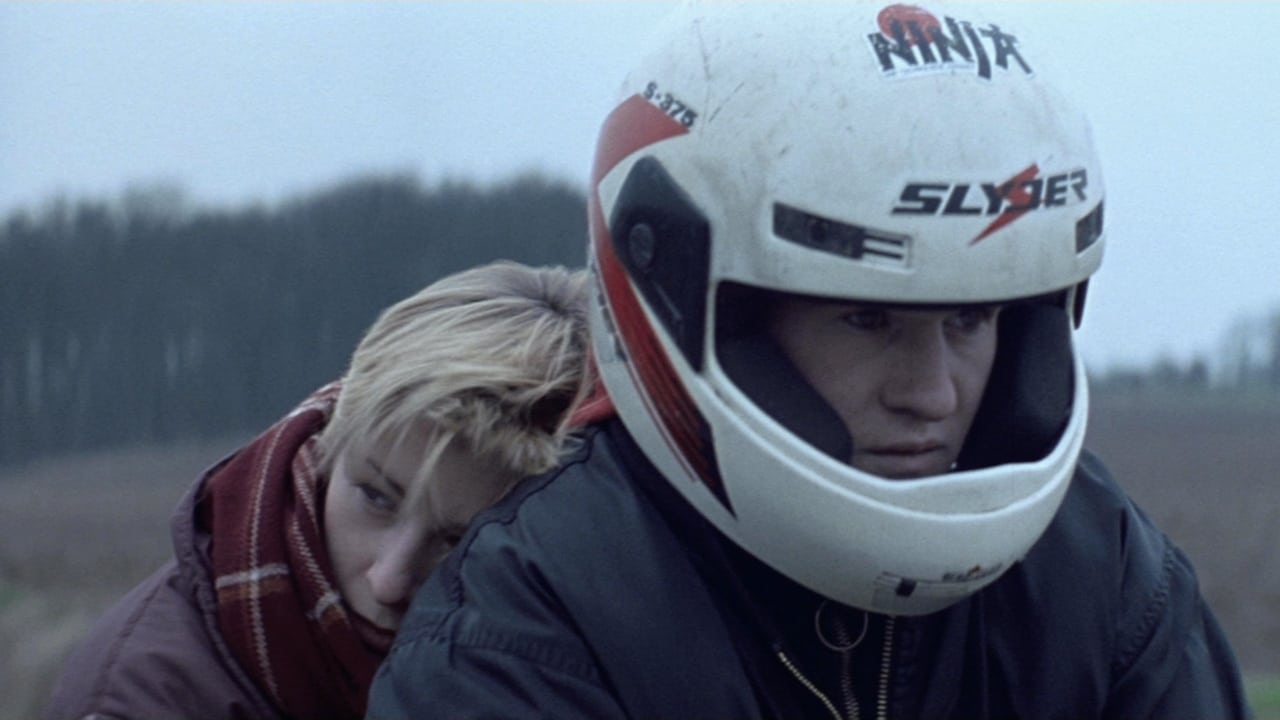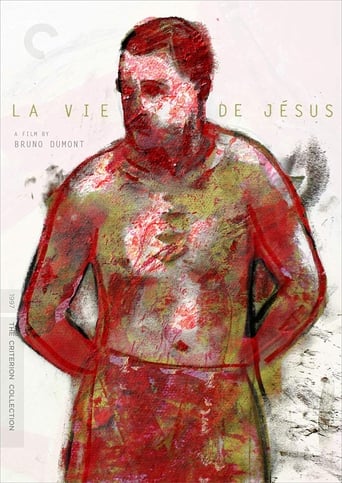



That was an excellent one.
Although it has its amusing moments, in eneral the plot does not convince.
View Moren my opinion it was a great movie with some interesting elements, even though having some plot holes and the ending probably was just too messy and crammed together, but still fun to watch and not your casual movie that is similar to all other ones.
View MoreIt's a movie as timely as it is provocative and amazingly, for much of its running time, it is weirdly funny.
View MoreLa Vie de Jesus, a film by Bruno Dumont, is an unconventional look at marginal young people living in Bailleul in northern France. They spend their time without much purpose, riding around the drab Flanders town on motorbikes or playing in a marching band. From the opening of the film, I could sense that I was in the hands of a director with unique talent. One of Dumont's greatest strengths is his uncanny ability to capture the sense of emptiness of the town and the people who inhabit it. With little dialogue and no musical score other than the sounds of nature to break the stillness, we are forced to relate to the characters by observing their eyes, their physical movements, and the facial expressions that reveal an inner sadness. In La Vie de Jesus, unemployed, uneducated, and epileptic 20-year old Freddy (David Douche) lives with his mother Yvette (Genevieve Cottreel), a café owner. Douche gives a haunting performance as the sensitive but not very bright Freddy, his body scarred from repeated falls from his motorcycle and his face mirroring the fear of not knowing when his next epileptic seizure will come. Freddy has a girl friend, Marie (Marjorie Cottreel), who works as a cashier at the supermarket but their relationship lacks an emotional pull and their graphically depicted sex feels mechanical. Dumont does not judge his characters and they are fully three-dimensional, both guilty and innocent, displaying tenderness one minute and cruelty the next, searching for human connection. Freddy trains his finch to sing and takes the boy who just lost his brother to the beach to cheer him up, yet shortly afterwards he and his friends humiliate an overweight girl who plays in the band. One of the most moving scenes takes place at a hospital where the friends stand around a hospital bed watching one of the boys' brother who is dying of Aids. On the wall there is a picture of Jesus described as "about a guy who comes back to life". They do not talk but wait and watch silently and we wait with them as if expecting momentary redemption. Freddy and his friends are not "bad" people but each one is tightly wound, looking for a reason to explode and the film seethes with tension. When a young Arab boy Kader (Kader Chaatouf) foolishly tempts fate by making a play for Marie, the underlying racism of the society transforms an ordinary love story into a tragedy of transcendent power.
View MoreDrama about racial tensions in a small French town, with the central plot revolving around a 22 year old epilepsy sufferer called Freddy. The film explores the monotonous nature of life in the town using a group of guys, including Freddy and the venting of their anger on an Arab boy whom Freddy believes to be a sexual rival. The film also explores the boredom of Freddy by showing how tedious and monotonous his life is, his only respite being found in the sex he has with his girlfriend and the seemingly endless rides into the countryside that he has on his moped.None of the film is as interesting as it might sound and has little merit other than the scene towards the end of the film where Freddy is lying in the grass after escaping from prison, which though beautiful could not begin to redeem this boring, monotonous and quite self indulgent film. The sex scenes are appallingly shot and unromantic in the extreme but I dare say a necessary addition to the film, showing the lack of communication and love between Freddy and his girlfriend Marie. Then there's the long shots of Freddy and his friends riding their mopeds through the French countryside, which are very boring and too frequent.Scenes of interest in the film are the aforementioned one at the end of the film, and the one where Freddy and the gang visit a friend in hospital who is dying of AIDS. This scene is quite well observed and the only one where there is anywhere near good acting.My main quarrel with this film is that there is little character developement and little emphasis on the racism aspect of the storyline which according to the box cover is what the film is all about. A film that has been called 'important' by certain reviewers should at least stay true to its themes and and have some sort of message which this film clearly does not.Overall, I didn't completely dislike this film - in some places I found it touching and perhaps moving, but it isn't worthy of the full marks it has been given in some reviews. The acting is sub-standard and the script is atrocious - or maybe that's just the translation, and the film is very jumpy.All in all a fair attempt from first time director 'Bruno Dumont', which catches the mood of each scene exceptionally well, but unless you have the opportunity to see this film for free, it really isn't worth bothering with. If you want to see a truly great French film - try 'Amelie'.2/5
View MoreThere is enormous promise in the opening scenes of Bruno Dumont's first feature "La Vie de Jesus". He is clearly a director with a great feeling for landscape, that ability to draw the viewer into a self-contained world, in this case an agricultural area of Northern France. Within minutes we know what it is like to live in this small redbrick town bounded by seemingly endless lanes and fields where very little happens and even the local cafe is all but deserted on a weekday mid-afternoon. We share the stifling boredom of the group of unemployed youths with little do except joyride their mopeds. We are in a world akin to that of Bresson's "Au Hazard Balthazar" and "Mouchettte" with Dumont revealing his with the assured unflinching vision of the master himself. Already we are beginning to sense the thrill that comes with the intuition that we may be discovering a major new talent. A brilliantly observed scene where the group of friends visit the brother of one of them who is in a coma dying of AIDS seems to confirm this. Words cannot convey their feeling but expressions say everything. However after this doubts gradually creep in. It requires real genius to sustain viewer interest in a film about provincial ennui. Not that nothing happens. There is an attack on an Arab youth that results in manslaughter, an arrest and an escape. The problem is not a lack of psychological development. There is an inevitability about the main protagonist, Freddy's obsession with the only girl around and his gunning for the Arab as a result of sexual rivalry fuelled by group racism. Rather is the problem one of a lack of narrative development. One sequence of moped riding becomes just like any other as do all those scenes of young people just moping around. Unfortunately the film eventually evokes viewer tedium in a way that is self defeating. Nevertheless there is excitement in the discovery of a new directorial talent and the prediction that he could in time make a really outstanding film.
View MoreBruno Dumonts "La Vie de Jésus" is one of the best movies I saw that year. It's a very gripping tale of a group of bored, at first glance no-good youngsters, who end up in a lot of trouble because of their racism. To me, without being a patriot, this isn't really a French, but a Belgian movie. The setting (French Flanders), but also the themes it deals with, the environment (no foreigner can fully grasp the horror of all those old people sitting on their chairs in the doorstep, waiting for something to happen, staring at the occasional passer-by). But whatever country it is made in, it is a strong story, filmed in a raw way, which very much fits the rawness of the characters in the movie. If you take under notice that all the actors were amateurs, yet they manage to make lots of so-called pros look like the real amateurs, you have to give the director credit for that.
View More